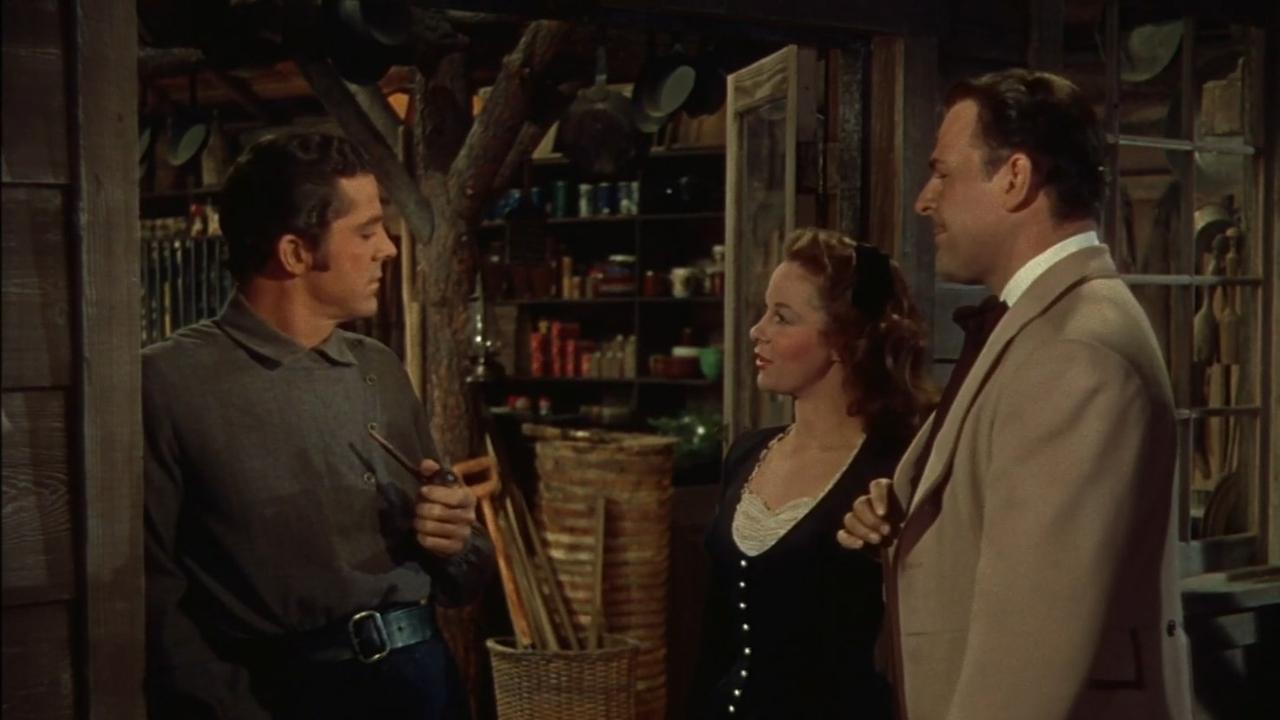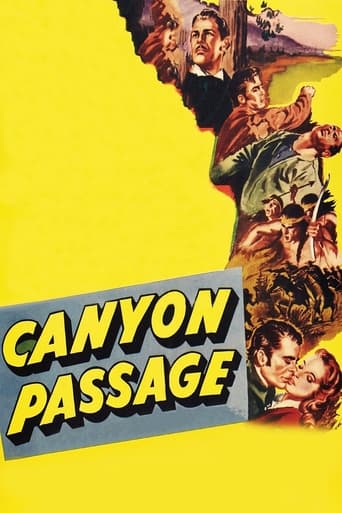

Good start, but then it gets ruined
... View Morebrilliant actors, brilliant editing
... View Moren my opinion it was a great movie with some interesting elements, even though having some plot holes and the ending probably was just too messy and crammed together, but still fun to watch and not your casual movie that is similar to all other ones.
... View MoreThe performances transcend the film's tropes, grounding it in characters that feel more complete than this subgenre often produces.
... View MoreNo need to recap the 1850's Oregon plot since it's pretty complex, anyway.Excellent Western, though the subplots tend to crowd up. The Logan (Andrews), Camrose (Donlevy) friendship is an interesting and offbeat one, especially concerning the lovely Lucy (Hayward). In fact, that subplot is more like a romantic quadrangle once Caroline (Roc) is added to the mix. And what great background scenery with the rolling green hills and far-off snowy peak. Note too, how combat with the Indians is not on horseback, the custom in westerns. Instead, the opposing forces skulk through the forest, a neat kind of eerie effect. And I've seen a lot of Ward Bond movies, but none where his hulking menace is any scarier than here. When he spies the Indian maiden alone and swimming in the lake, my imagination shuddered and ran wild.Underrated Director Tourneur hit his stride about this time with (Out of the Past, {1947}), and (I Walked with a Zombie {1943}, for example. So it's not surprising he would add the brutal but realistic tomahawking of the helpless settlers' wives, a memorable if gruesome feature. Anyway Tourneur tries to keep up the pacing despite the passing romantic interludes, such that we hardly notice the many characters drifting in and out. Low-budget Universal really popped a load for this A-Western, including the cabin raising sequence that's both well- stocked and ironic in view of later events. All in all, I don't know where the canyon of the title was, but I didn't miss it a bit.
... View MoreThis film opens in Portland, Oregon in the 1850s; businessman Logan Stewart rides into town and withdraws some of his gold from storage; he runs a freight business and wants to expand; ultimately he hopes to bring the stage coach to the growing town. Somebody obviously knows he has gold on him as he is attacked in his room during the night; the assailant gets away but Logan has an idea who it could be; Honey Bragg; a man Logan suspects murdered a couple of miners a few days before. The next morning he leaves town with Lucy, the fiancée of his friend George. They are heading to Jacksonville where George runs the gold store... in effect the town bank. For some time after this nothing much happens; we see the townsfolk coming together to build a house for a couple of newly wed farmers; there is a tense but peaceful meeting with the local Indians and we learn that George likes to gamble rather more than he should. The action kicks off later when a man is murdered shortly after returning to town; George is the chief suspect as it is believed that he had been helping himself to peoples gold. Logan points out that the evidence is circumstantial and their 'trial' isn't legal but it is clear that they intend to hang George at nightfall; when he sees a chance Logan helps his friend escape. Bragg meanwhile has killed again; this time an Indian woman... the rest of the tribe are now on the warpath and many people will die before peace returns to Jacksonville.Given its age I had expected this film to be in black and white but it was in glorious Technicolor... just what the glorious Oregon setting required! The opening half of the film may have been fairly action free but it did a fine job of introducing us to the characters and giving us a glimpse in to the lives of people living far away from 'civilisation'... they may have been in the United States but if something needed doing they had to do it themselves; that included defending themselves when things got dangerous. By the time the action started I had grown to care about the characters. The action when it came was more shocking than I'd expected; among those we see killed are women and children we have been introduced to earlier on. The characters aren't all what one would expect in a western of this era; this is especially true of George who puts his gambling addiction ahead of his fiancée and is almost certainly guilty of the murder he was accused of. The acting was solid with Dana Andrews doing a good job as Logan and Brian Donlevy being equally good as his friend George. Director Jacques Tourneur did a fine job; perhaps it is because he was French rather than American that this feels so different from other westerns of that era I've seen. Overall I'd certainly recommend this to fans of the genre.
... View MoreCanyon Passage (1946)This is a tale with a not so subtle moral message--the man who is modest, just, and hardworking is the better man. And he'll get the sassy girl, the one who is currently attached to the gambling big spender who is the good man's friend and opposite. Dana Andrews plays the virtuous leading man perfectly--he's strong without being a tough or outrageous strong man (like John Wayne) and he's also kind, with a smile the shoots off his sombre face like a flash of light. That's he's popular with women is no surprise, but he's committed most of all to being a successful businessman, and a restless one, roving from outpost to outpost in beautiful Oregon.His counterpart is the likable but flawed Brian Donlevy, who is really the perfect choice here because he isn't the kind of paradigm we will quite fall in love with. The woman who steals the show is Susan Hayward. And then there is Hoagy Carmichael, playing a role he often plays, the musician wise man who sees everything and understands it before anyone else. It's a great group, supported by hundreds of others (yes--an ambitious film) and directed with a subtle, fast touch by the unsung great, Jacques Tourneur.So, in short, "Canyon Passage" was surprise and a total pleasure. I couldn't take my eyes off of the photography and the rich color, good pure Technicolor with the redoubtable Natalie Kalmus coordinating. The plot is strong, and Andrews is terrific in scene after scene. Westerns are sometimes difficult to see from the 21st Century without putting it into some history of film context, but this one works as a drama, pure and simple, a drama set out west in the late 1800s. The movie is also unique in being set in the lush mountains near Portland, Oregon. The scenery is gorgeous in the big sense, but every small scene is lush and forested and rainy--almost the opposite of that dry, open, blue sky norma in a "Western" strictly speaking. Interiors in golden lamplight lead to exteriors of dripping greens and blues, or the delicate grays of night.Even the music is great, especially the lighthearted and clever songs by Carmichael. (The great Frank Skinner handled the rest of the score.) Edward Cronjager is one of the dozen great cinematographers of classic Hollywood, and in this you can see why. It's a complex film, visually, and it never lets up. Especially the night scenes (where the lights and sets could be controlled perfectly) are vivid and have that controlled beauty of great studio (and location) Hollywood. If any of these elements sound good, I wouldn't miss this film.
... View MoreFrequently termed as "psychological", this find of a western, directed by the great Jacques Tourneur less than a year before Out of the Past, is way beyond this kind of terminology. In fact there's no psychology at all, unless you count as such what the spectator compulsively does in need to explain character actions. Tourneur however, not for a moment indulges in narrative superficiality. Instead convolutes a series of deeds, juxtaposes numerous characters, focuses obsessively in directing the glances between the characters (always in medium shots), complexes his camera movements and setups in a way as to convey western dialectics rarely seen before or after. From a presentation of the settler's phase in mid 19th century American west, to a thinly disguised homosexual relationship and from a discussion of frontier justice to an elliptically thoughtful apology on the American Indian issue, Canyon Passage (no canyon in the film ) is the archetypal Western film of actions (but no action, apart from the final Indian attack) defining human character and motive. Tourneur's first (and gloriously shot) colour film.
... View More